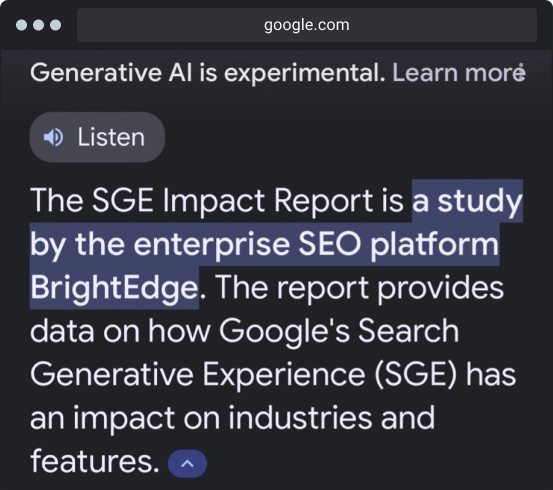At BrightEdge, our Generative Parser TechnologyTM has provided us a front-row seat to the evolving landscape of Google’s Search Generative Experiences (SGE). This is a pivotal moment for observing Google’s search technology, as we are witnessing their experimentation and learning processes as they happen. Our Ultimate Guide to SGE has been regularly updated with our findings, highlighting new features and adjustments in the user search experience. In February we saw a flurry of activity and developments. They all signify that Google is getting more comfortable with SGE results showing up more frequently but are still actively experimenting with new formats and interactive elements.
1. Google is showing SGE results on more keywords.
This is true particularly in certain sectors. In the initial stages of BrightEdge’s Generative Parser deployment in November, about 16% of all searches did not yield an SGE result. Currently, this has reduced to 14% across various search types. However, this decline is not uniform across all keyword categories. Notably, there has been a significant drop in non-SGE results in certain industries, with some nearly eliminating non-SGE results entirely. These industries include:
- Education – from 10% ro 2%
- B2B Technology – from 5% to less than 1%
- Ecommerce – from 5% to less than 1%
- Restaurants – from 2% to 0%
This pattern indicates that Google may be gaining confidence in the performance of SGE, leading to its more frequent appearance in search queries.
2. Opt-in results grew and collapsed results were in decline.
Opt-in results require a user action to activate the SGE, whereas collapsed results are pre-generated and simply need a click to fully reveal them. This distinction is crucial because with an Opt-in result, you must wait for the SGE to render. Despite this, the evolving nature of SGE, which is still in beta, suggests a user preference for the opt-in method. At the start of February, 40% of the keywords we monitored offered an opt-in SGE experience; by the end of the month, this figure rose to 45%. This uptrend is a continuation from November, when only 36% of keywords had this feature.
Conversely, collapsed results are becoming less common. In early November, 42% of our tracked keywords displayed a collapsed result, which declined to 40% by February’s start and dropped further to 33% by the end of the month. For SEO professionals focused on organic search visibility, this trend could imply that traditional organic results may maintain their prominence. Since users must wait for SGE results to render, they spend more time viewing the search engine results page (SERP), and they might opt to skip hitting the “generate” button, bypassing the SGE result. The pattern observed over recent months, and especially in February, suggests Google’s inclination towards favoring the opt-in experience.
3. Experimentation with new formats and results hasn’t slowed down.
Our tracking has captured various instances of this experimentation. Here’s a few examples:
- In December, Google tested “full” SGE results that fully rendered without user interaction, but these were removed by January.
- Also in December, we observed a transient introduction of a specific type of value card for products that briefly showed up in 2% of keyword searches, only to be phased out and replaced by the product Apparel Value Card, which is now displayed in about 7% of all searches.
- In February we saw the appearance of a “Listen” button, which we spotted for a limited number of queries during the week of February 19th. However, this feature stopped appearing by February 24th. While these changes might not have immediate implications for SEO strategies, they do suggest that Google is open to exploring different formats within SGE.
- The presence of more SGE results combined with this willingness to test various approaches indicates that there could be further one-off trials in the pipeline, potentially seen in March.

4. SGE results take up more real estate on a page than they did a month ago.
As Google’s confidence in Search Generative Experiences (SGE) seems to be solidifying, indicated by fewer instances of non-SGE search results, the physical size of these SGE results is also increasing. At the start of the month, the average pixel height of an SGE result was measured at 1,217 pixels. This figure has grown to an average of 1,277 pixels. There was even a brief period when Google experimented with significantly larger SGE results, with the average height peaking at 1,348 pixels for a couple of days.
This experimentation with size not only shows Google’s commitment to refining SGE results but also highlights their search for the optimal way to present these modules to users. Interestingly, the size of SGE results varies across different industries. For example, in e-commerce, the median height of the SGE result is 2,093 pixels in height. Meanwhile, finance keywords tend to be much smaller, with the median pixel height being only 750 pixels. This suggests that Google is tailoring the SGE experience to suit the content requirements of each industry.
5. Shopping experiences have gotten more engaging.
Just in the last week, we’ve seen Google begin to deploy two new ways to shop. They first called a Product Viewer Shopping Product Facet.

With this module, now we can see that SGE is allowing users to compare facets of a product across different modules (query is “OLED TV”). It enables users to directly compare different aspects of products—such as OLED TVs—across various modules within the search results. This functionality enhances the ability for users to conduct comprehensive top-of-funnel research without leaving the search page.
For SEOs, the implication is clear: product features need to be prominently featured and consistently presented to ensure that the AI can effectively utilize and reference the content. This can increase the visibility and competitiveness of products in search results.
Furthermore, SGE is now augmenting search results with suggested queries. For instance, when searching for an OLED TV, SGE might suggest exploring ‘gaming’ and ‘4k’ as related topics. Selecting ‘Gaming’ redirects users to a search experience specifically curated for gaming TVs, allowing for a more targeted search process. This feature emphasizes the need for SEOs and content creators to understand and integrate long-tail content elements—such as use cases, benefits, specifications—into their product information, as these details become increasingly crucial for capturing highly qualified traffic. At BrightEdge, Copilot for Content Advisor can assist you in doing this by incorporating long tail keywords into content briefs or even your first drafts. These are must-haves for providing content that be sourced in experiences such as these.

Now, users are getting information for what to consider very specifically for gaming TV’s. This level of specificity in search results empowers users to make more informed decisions by understanding exactly what to consider for their individual needs. For SEO professionals and content creators, this development underscores the increasing value of long-tail content—those details that surround a product, like use cases, benefits, and specifications. As Google assists users in narrowing down their exact preferences within the search results, the significance of this detailed content becomes even greater. It’s expected to be a more influential factor in attracting highly qualified traffic moving forward.
Data collection on the prevalence of these detailed SGE results is ongoing. The insights gleaned from this will be revealed in the forthcoming edition of the Ultimate Guide, providing a clearer picture of how these enhancements are influencing visibility within search results.
As we continue to monitor the landscape of Google’s Search Generative Experiences (SGE), we eagerly anticipate what new developments and innovations the coming month will bring. Our commitment is to keep you informed of the key insights and significant changes as they happen in real-time. To stay updated on the latest trends and experiments in SGE, we recommend you bookmark our Ultimate Guide to SGE. Make sure to revisit often for the most recent updates and comprehensive analysis!
